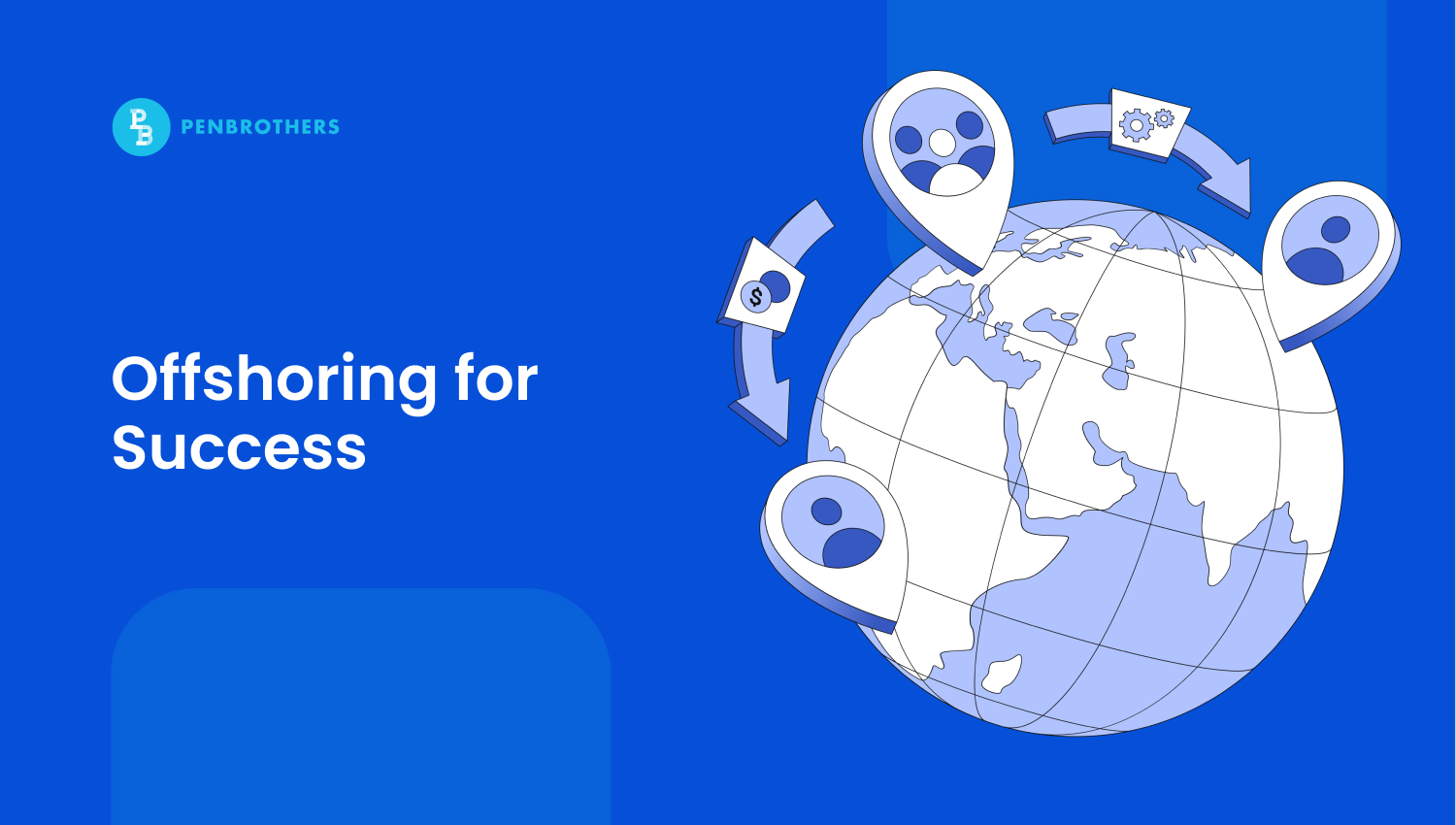What's Inside?
How to Build an Offshoring Strategy for Competitive Advantage in 2025

Every executive knows the talent shortage is real. What most don’t grasp is the scale: 85.2 million skilled positions will sit empty by 2030, costing the global economy $8.5 trillion in lost growth. Traditional hiring won’t solve this. Neither will traditional offshoring. The companies that understand this distinction will own their industries.
Consider the numbers. The United States alone faces $1.748 trillion in unrealized revenue by 2030. Technology roles bear the brunt of this crisis, with companies desperately competing for specialists in AI, machine learning, and data analytics who simply don’t exist in sufficient numbers domestically, creating a bidding war for talent that drives up costs while leaving critical positions unfilled month after month.
Most executives still treat offshoring as cost-cutting. Find cheaper labor. Negotiate hard on rates. Hope for decent results. This thinking worked when the goal was expense reduction, back when you could outsource call centers and expect adequate customer service, or move manufacturing and maintain quality standards with proper oversight.
It fails catastrophically today.
Building an offshoring strategy for competitive advantage in 2025 means recognizing that you’re not buying cheaper labor. You’re accessing scarce capabilities. You’re accelerating development cycles that determine whether you reach market first or watch competitors capture the ground you should have taken.
Key Takeaways
- Shift from Cost-Cutting to Capability-Building: The core message is that modern offshoring is no longer about finding cheaper labor. It’s a strategic necessity to access scarce global talent and gain a competitive advantage. A “cost-first” approach is a trap that ignores hidden expenses and leads to failure.
- Most Strategies Fail by Focusing on the Wrong Metrics: Offshoring initiatives often fail because companies measure success by cost per hour instead of value per deliverable. They treat offshore teams as disposable vendors rather than integrated partners, leading to poor quality, cultural friction, and a failure to achieve strategic goals.
- A Strategic Framework is Essential for Success: A successful strategy requires a Value Hierarchy Assessment to determine what to offshore based on its impact on revenue. It also demands a thorough Risk Analysis covering operational, structural, and strategic risks, which must be mitigated from the start.
- Implementation Should Be Deliberate and Scalable: The best way to begin is with a well-designed pilot program focused on a function that is important but not mission-critical. Success depends on building scalable quality assurance systems and intentionally fostering cultural integration to ensure the offshore team operates as a true extension of the company.
Why Most Offshoring Strategies Fail (And How Yours Won’t)
Walk into any boardroom where offshoring gets discussed. You’ll hear the same conversation. “What’s the cost per hour?” “Can we negotiate them down?” “How much will we save?” This thinking destroys more value than any competitor ever could.
The Cost-First Trap That’s Killing Strategic Value
The numbers tell a brutal story. Research shows that companies experience substantial “hidden costs” when implementing activities abroad, costs that weren’t calculated in those initial spreadsheets executives used to justify offshoring decisions. These hidden expenses include knowledge transfer, quality control, coordination overhead, and management time that wasn’t factored into the original cost-benefit analysis.
Consider what happened to companies that signed offshoring contracts between 2001 and 2004. Both Boston Consulting Group and Gartner predicted that 50% would fail to meet expectations. The primary culprit? Cost-first thinking that ignored strategic fit.
Take Bluegogo, once China’s largest bike-sharing company with over 20 million users. The company collapsed partly due to cost-cutting in its offshoring approach, delegating critical operations to external providers without considering skill alignment or long-term strategic implications. When you optimize for price alone, you get exactly what you pay for.
The math executives need to solve isn’t cost per hour. It’s value per capability. The right offshore partner accelerates time to market, accessing skills that would take years to build domestically, and providing capacity that scales with your growth rather than constraining it. WhatsApp understood this when they leveraged Eastern European developers to build their core application, allowing their lean team to focus on business growth while accessing world-class technical talent that simply wasn’t available locally at any price.
Moving from expense reduction to capability acceleration requires rethinking the entire equation. Instead of asking “How much will this cost?” the strategic question becomes “How much faster can we execute our growth plan with access to these capabilities?” When Facebook acquired WhatsApp for $19 billion, they weren’t buying a cost-saving operation. They were acquiring a platform that had used strategic offshoring to outmaneuver competitors with vastly larger budgets.
Why Doesn’t Offshoring Work?
Offshoring fails for the same reason most strategic initiatives fail: companies execute tactics without strategy.
The pattern is predictable. Executive team sees competitor announcements about cost savings through offshoring. CFO builds a model showing 40% reduction in operational expenses. Company signs contract with lowest-cost provider. Six months later, they’re spending more on coordination than they saved on salaries, quality has deteriorated, and internal teams are in revolt.
I’ve analyzed dozens of failed offshore initiatives. The failure points are remarkably consistent. First, companies treat offshore teams as vendors rather than extensions of their organization. They create us-versus-them dynamics that guarantee dysfunction. When your Manila team feels like second-class citizens, they perform like second-class citizens. When your Polish developers are excluded from strategic discussions, they write code without understanding business context.
Second, companies underestimate the complexity of distributed operations. They assume video calls and Slack channels solve coordination challenges. They don’t. Time zone differences compound decision-making delays. Cultural differences create misunderstandings that surface as quality issues. Knowledge silos develop when teams don’t share physical spaces. These aren’t insurmountable problems, but they require intentional solutions most companies don’t implement.
Third, companies optimize for the wrong metrics. They measure cost per hour instead of value per deliverable. They track headcount savings instead of time-to-market acceleration. They celebrate reduced expenses while missing delayed product launches and decreased customer satisfaction. The metrics that matter for strategic success (capability development, innovation velocity, market responsiveness) get ignored because they’re harder to quantify than hourly rates.
The structural problem runs deeper. Most offshoring initiatives start from defensive positions, cutting costs to maintain margins, addressing talent shortages that threaten operations, responding to competitor moves. Defensive strategies rarely succeed because they focus on minimizing losses rather than maximizing gains.
Successful offshoring requires offensive thinking. You’re not merely cutting costs; you’re accessing capabilities. You’re not just solving talent shortages; you’re building competitive advantages. You’re not responding to market pressures; you’re creating them. This mindset shift changes everything from partner selection to success metrics to governance structures.
Make Offshoring Decisions That Drive Results
Most executives approach offshoring like they’re buying office supplies. Compare vendors. Check references. Sign contracts. Then wonder why their carefully planned initiative feels like managing chaos from 8,000 miles away.
Smart decisions require a different approach. You start by understanding what you’re actually trying to accomplish, then work backward to the capabilities you need. Simple concept. Difficult execution. The companies that master this process don’t just save money—they build competitive moats.
Value Hierarchy Assessment
Not all business functions deserve the same consideration. Some drive revenue directly. Others enable the functions that drive revenue. Still others simply keep the lights on. Getting this distinction wrong costs more than bad vendor selection ever could.
Start with revenue impact. Which processes directly generate customer value, create competitive differentiation, or enable market expansion? These live at the top of your hierarchy. Customer-facing product development for a SaaS company. Investment research for a hedge fund. Clinical trials for a pharmaceutical company. Move these offshore only when you can access capabilities that genuinely accelerate results, not when you want to reduce headcount.
The middle tier handles critical enablement. Finance operations that keep the business running smoothly. IT infrastructure that supports customer-facing systems. HR processes that maintain compliance and culture. These functions matter enormously but don’t differentiate your company from competitors. You can offshore them successfully when you find partners who understand the complexity and can maintain quality standards that match or exceed your internal capabilities.
The bottom tier manages commodity operations. Data entry. Basic customer support. Routine compliance reporting. These processes are necessary but standardized across industries. Price becomes a valid consideration here because the work itself offers limited competitive advantage. The goal is efficiency, not innovation.
This hierarchy shifts as markets evolve. What’s commoditized today might become competitively critical tomorrow as customer expectations change or new technologies emerge. Social media management was commodity work until it became a primary customer acquisition channel. Data analytics was a nice-to-have until it became essential for personalization and customer retention.
For companies preparing for M&A, this assessment becomes even more crucial. Acquirers evaluate not just financial performance but operational sophistication, scalability, and risk management. A well-designed offshore operation demonstrates management competency and creates scalable processes that support growth. A poorly designed one becomes a liability that reduces valuation and complicates due diligence.
Risk Analysis
Every offshore decision involves three types of risk that compound differently over time. Operational risk hits immediately. Structural risk grows gradually. Both can derail results if you don’t plan for them upfront.
Operational Risk emerges from execution challenges. Cultural misalignment between your team and theirs. Communication protocols that work in theory but break down under pressure. Quality control processes that miss critical issues until customers complain. Time zone differences that slow decision-making when you need rapid responses. These problems surface quickly, usually within the first six months, and they’re often fixable with proper management attention and process adjustments.
The key mitigation is cultural integration planning. Not corporate culture workshops or team-building exercises. Real integration means understanding how your offshore partners think about problem-solving, customer service, and quality standards. It means establishing communication rhythms that account for time zone realities without creating bottlenecks. It means defining quality metrics that both teams understand and agree matter for business success.
Structural Risk develops from relationship dynamics and contract terms. Vendor dependency that makes switching providers expensive and time-consuming. Intellectual property exposure when sensitive processes move offshore. Contract terms that favor the provider when renewal negotiations begin. Knowledge transfer requirements that create operational vulnerabilities if the relationship ends unexpectedly.
These risks require upfront planning that most companies skip. Split critical functions between multiple providers so you’re never completely dependent on one relationship. Retain enough internal capability to train new partners if necessary. Structure contracts with buffer periods that give you time to transition if relationships deteriorate. Document processes thoroughly so knowledge doesn’t live exclusively with offshore teams.
Strategic Risk involves market timing and competitive dynamics. Moving too slowly while competitors access global talent pools faster. Moving too quickly without adequate planning and creating operational disruptions that customers notice. Talent retention challenges when your best people feel threatened by offshore expansion. Competitive response when rivals use your offshore moves to position themselves as more committed to domestic employment.
The mitigation requires connecting offshore decisions to broader business objectives. If you’re expanding into new markets, offshore capabilities should support that expansion rather than just reducing costs. If you’re developing new products, offshore teams should accelerate development cycles rather than just handling routine maintenance. If you’re preparing for acquisition, offshore operations should demonstrate scalability and process maturity rather than just cost savings.
Technology and Infrastructure Requirements
The technology stack that supports offshore operations determines whether you’re building competitive advantage or creating expensive coordination overhead. Most companies underestimate these requirements and pay for it with reduced productivity and frustrated teams.
AI-ready workforce assessment starts with understanding which functions will benefit from automation and which require human judgment. Your offshore teams need training not just in current processes but in the tools and technologies that will reshape those processes. This means evaluating partners based on their commitment to continuous learning and technology adoption, not just current capabilities.
Data security frameworks must meet global compliance standards from day one. GDPR, CCPA, SOX, HIPAA—the acronyms matter less than the reality that data breaches destroy trust and create liability that offshore cost savings never justify. The right partners invest in security infrastructure that often exceeds what smaller companies can afford domestically. The wrong partners treat security as a checkbox rather than a business requirement.
Hybrid work technology integration enables seamless collaboration across geographies and time zones. This goes beyond video conferencing and file sharing. It includes project management systems that track work across multiple locations, communication tools that maintain context across asynchronous interactions, and development environments that allow distributed teams to work on the same codebases without conflicts.
The companies that excel at offshore operations treat technology infrastructure as competitive advantage, not operational expense. They use superior tools and processes to coordinate distributed teams more effectively than competitors coordinate local ones. They leverage global talent pools to maintain development velocity that domestic-only competitors cannot match. They build operational resilience that turns geographic distribution from risk into competitive moat.
How to Implement Your Offshoring Strategy
Most offshore initiatives start with grand plans and detailed spreadsheets. Six months later, executives find themselves managing more complexity than they eliminated, wondering why their carefully designed cost savings turned into expensive coordination overhead.
The difference between success and expensive lessons lies in implementation discipline. You start small. Prove the concept works. Then scale systematically rather than optimistically. This approach frustrates executives who want immediate results, but it builds operations that compound competitive advantage rather than creating ongoing management headaches.
Pilot Program Design for Executive Confidence
Boards care about three things when evaluating offshore initiatives: risk mitigation, measurable results, and scalability potential. Your pilot program must deliver evidence on all three dimensions, which means choosing the right function to test and defining success metrics that translate to boardroom conversations.
Pick a pilot that matters but won’t sink the company if it struggles. Customer support for non-critical products. Data analysis for marketing campaigns. Software development for internal tools. The function should be complex enough to reveal operational challenges but contained enough that problems don’t cascade through other business areas.
Success metrics need to resonate with investors, not just operations teams. Revenue per employee for functions that drive growth. Customer satisfaction scores for client-facing operations. Time to market for development projects. Cost per transaction for operational processes. These numbers tell stories that boards understand and value when evaluating whether to expand offshore operations.
Scalability planning begins during pilot design, not after pilot success. Document every process that enables the pilot to function. Map every integration point between offshore and onshore teams. Identify every bottleneck that emerges as work volume increases. The goal is understanding how to multiply results, not just replicate them.
Communication frameworks that minimize management overhead require intentional design that accounts for time zone realities and cultural differences. Daily standups that rotate timing so no team bears the burden of inconvenient schedules consistently. Weekly planning sessions that align priorities and identify potential conflicts before they disrupt progress. Monthly reviews that evaluate both operational performance and relationship health, because offshore partnerships succeed or fail based on human dynamics, not just technical capabilities.
The companies that execute pilots successfully treat them as learning laboratories, not cost-cutting experiments. They invest management attention in understanding what works, what doesn’t, and why. They document lessons that inform scaling decisions rather than assuming pilot success guarantees enterprise-wide implementation success.
Quality Assurance Systems That Scale
Quality control for offshore operations requires different thinking than quality control for local teams. You can’t walk over to someone’s desk when problems emerge. You can’t rely on informal communication to catch issues before they affect customers. Everything must be systematic, measurable, and designed to work across distance and cultural differences.
Performance monitoring starts with defining quality in terms that both teams understand and can measure consistently. Response time for customer support tickets. Code review completion rates for development projects. Accuracy percentages for data processing tasks. Error rates for financial operations. The metrics matter less than ensuring both teams know what excellent performance looks like and how to measure whether they’re achieving it.
Real-time dashboards give you visibility into performance without requiring constant check-ins that drain productivity from both teams. Automated alerts flag problems before they compound. Regular performance reviews create opportunities to celebrate success and address challenges before they become relationship issues.
Cultural integration strategies move beyond superficial team-building activities to address real operational differences. Understanding how offshore teams approach problem-solving when they encounter unexpected issues. Establishing escalation protocols that account for time zone differences and decision-making authority. Creating feedback mechanisms that encourage honest communication about challenges without creating defensiveness or blame.
The most successful offshore partnerships develop cultural fluency that enables both teams to work together seamlessly despite geographic separation. This happens through consistent interaction, shared success metrics, and mutual respect for different approaches to achieving common goals.
Knowledge transfer protocols must protect intellectual property while enabling offshore teams to deliver results. Documentation standards that capture institutional knowledge without exposing sensitive competitive information. Access controls that provide necessary information while maintaining security boundaries. Training programs that develop offshore team capabilities while retaining critical knowledge internally.
The goal is creating sustainable knowledge-sharing that reduces dependence on key individuals while maintaining competitive advantage. When offshore teams understand not just what to do but why specific approaches matter for your business, they become strategic assets rather than operational extensions.
Building quality assurance systems that scale requires accepting that offshore operations will never be identical to local operations. They will be different. When designed properly, they will be better in specific ways that create competitive advantage. The companies that embrace this difference rather than fighting it build offshore capabilities that competitors struggle to replicate.
Future-Proofing Your Competitive Offshoring Position
The offshore operations you build today will determine your competitive position in 2030. Most executives think about offshoring as solving current problems. Smart executives use it to create future advantages that competitors cannot replicate quickly.
This requires different thinking. You’re not just accessing cheaper talent or faster delivery cycles. You’re building global capabilities that evolve with technology, scale across markets, and compound competitive advantage over time. The companies that understand this difference will own their industries when the next wave of technological disruption reshapes everything.
AI Integration and Workforce Evolution Planning
AI is reshaping offshore operations faster than most executives realize. Over 70% of offshore teams now integrate AI-powered development practices, using tools that automate code review, predict project bottlenecks, and optimize resource allocation in real time. The question isn’t whether your offshore teams will use AI. The question is whether they’ll use it strategically to accelerate your competitive advantage.
Training offshore teams for emerging technology requirements starts with understanding which capabilities will matter most for your business goals. Machine learning engineers who can optimize algorithms for your specific use cases. Data scientists who understand your industry’s unique patterns and challenges. AI integration specialists who can weave intelligent automation into your existing workflows without disrupting operations.
The best offshore partners invest heavily in continuous learning programs that keep their teams current with rapidly evolving AI tools and techniques. McKinsey research shows that AI technology is advancing at record speed, which means the offshore teams you work with today must be fundamentally different from those available even two years ago.
Innovation acceleration through strategic talent diversity creates competitive advantages that domestic-only teams struggle to match. When you combine Silicon Valley product thinking with Eastern European technical precision and Asian market insights, you get solutions that none of these regions could develop independently. This isn’t theoretical diversity philosophy. This is measurable competitive advantage through cognitive diversity that produces better decisions, faster problem-solving, and more resilient strategies.
Competitive positioning via global workforce distribution enables capabilities that single-location companies cannot replicate. 24-hour development cycles that accelerate time to market. Access to specialized skills that exist in meaningful numbers only in specific geographic regions. Cost structures that allow you to invest in innovation while competitors struggle with operational expenses that constrain their strategic options.
The companies that excel at AI-integrated offshore operations treat technology advancement as competitive moat-building, not operational efficiency. They use superior AI capabilities to coordinate distributed teams more effectively than competitors coordinate local ones. They leverage global talent diversity to identify market opportunities and technical solutions that single-geography teams miss. They build operational advantages that compound over time rather than delivering one-time cost savings.
Making the Strategic Decision: When Offshoring Becomes Essential
The talent crisis isn’t theoretical anymore. It’s happening in your industry, affecting your competitors, reshaping your market. You can continue competing for the same limited domestic talent pool, watching development cycles slow and costs escalate, or you can access the global capabilities that will define competitive advantage for the next decade. The difference between success and expensive lessons lies in working with partners who understand that strategic offshoring requires more than placing people overseas. At Penbrothers, we’ve developed what we call the Hypercare Framework because we’ve seen too many offshore initiatives fail from a lack of cultural integration and strategic alignment.
We don’t just connect you with talented Filipino professionals—we ensure they become genuine extensions of your team, positioned to accelerate your competitive advantage rather than create coordination overhead. If you’re ready to build offshore capabilities that drive results from day one, let’s discuss how the Hypercare Framework can accelerate your specific business objectives.
Frequently Asked Questions
The cost-cutting model fails because it ignores significant “hidden costs” associated with coordination, quality control, knowledge transfer, and management time. This approach often leads to poor service quality and strategic misalignment, ultimately destroying more value than the initial savings promised. The modern talent shortage means the goal is now accessing skills, not just reducing expenses.
The shift is from defensive to offensive thinking. Instead of defensively cutting costs or reacting to talent shortages, an offensive strategy uses offshoring to proactively build a competitive advantage. This means changing the primary question from “How much will this cost?” to “How much faster can we execute our growth plan with access to these capabilities?”
The article recommends a Value Hierarchy Assessment to categorize business functions:
Top Tier (Direct Revenue Impact): Functions like core product development. Only offshore these to access world-class capabilities that accelerate results.
Middle Tier (Critical Enablement): Functions like finance and IT. Offshore these to partners who can deliver quality that matches or exceeds internal standards.
Bottom Tier (Commodity Operations): Functions like basic data entry. These are suitable for offshoring with a greater emphasis on cost-efficiency, as they offer limited competitive advantage.
The article outlines three primary risks:
Operational Risk (execution challenges): Mitigated through careful planning for cultural integration and clear communication protocols.
Structural Risk (vendor dependency, IP exposure): Managed by using multiple providers for critical functions and structuring contracts to protect your interests.
Strategic Risk (market timing, competitive response): Handled by ensuring the offshoring strategy is directly aligned with broader business objectives, like market expansion or product development.
The recommended approach is to start small with a pilot program. Choose a business function that is important enough to test the model but not so critical that failure would sink the company. Define clear, business-relevant success metrics (e.g., customer satisfaction, time to market) and use the pilot as a learning opportunity to document processes and resolve issues before scaling the operation.




